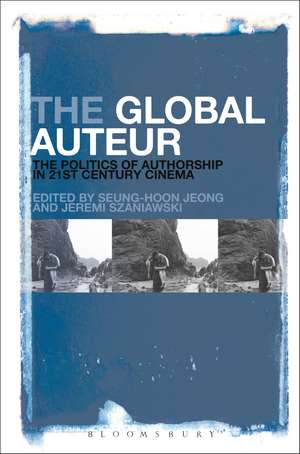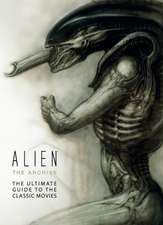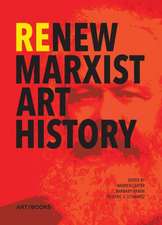The Global Auteur: The Politics of Authorship in 21st Century Cinema
Editat de Seung-hoon Jeong, Professor Jeremi Szaniawskien Limba Engleză Paperback – 27 dec 2017
| Toate formatele și edițiile | Preț | Express |
|---|---|---|
| Paperback (1) | 241.42 lei 6-8 săpt. | |
| Bloomsbury Publishing – 27 dec 2017 | 241.42 lei 6-8 săpt. | |
| Hardback (1) | 777.47 lei 6-8 săpt. | |
| Bloomsbury Publishing – 15 iun 2016 | 777.47 lei 6-8 săpt. |
Preț: 241.42 lei
Preț vechi: 307.65 lei
-22% Nou
Puncte Express: 362
Preț estimativ în valută:
46.22€ • 47.42$ • 38.92£
46.22€ • 47.42$ • 38.92£
Carte tipărită la comandă
Livrare economică 26 februarie-12 martie
Preluare comenzi: 021 569.72.76
Specificații
ISBN-13: 9781501338564
ISBN-10: 1501338560
Pagini: 416
Ilustrații: 40 bw illus
Dimensiuni: 229 x 154 x 23 mm
Greutate: 0.54 kg
Ediția:NIPPOD
Editura: Bloomsbury Publishing
Colecția Bloomsbury Academic
Locul publicării:New York, United States
ISBN-10: 1501338560
Pagini: 416
Ilustrații: 40 bw illus
Dimensiuni: 229 x 154 x 23 mm
Greutate: 0.54 kg
Ediția:NIPPOD
Editura: Bloomsbury Publishing
Colecția Bloomsbury Academic
Locul publicării:New York, United States
Caracteristici
Offers a new perspective on the concept of the auteur in world cinema, reinvestigating it both from a political and philosophical perspective
Notă biografică
Seung-hoon Jeong is Assistant Professor of Cinema Studies at New York University Abu Dhabi. He wrote Cinematic Interfaces: Film Theory After New Media and co-translated Jacques Derrida's Acts of Literature into Korean (both 2013). Jeremi Szaniawski is the editor of Directory of World Cinema: Belgium and the author of The Cinema of Alexander Sokurov: Figures of Paradox (both 2014), as well as the translator, into French, of Thomas Elsaesser's and Malte Hagener's Film Theory: An Introduction Through the Senses (2011) and Alexander Sokurov's V tsentre okeana (2015).
Cuprins
List of IllustrationsNotes on the ContributorsIntroduction (Jeremi Szaniawski, Korea National University of the Arts, Republic of Korea, and Seung-hoon Jeong, New York University Abu Dhabi, UAE)Chapter 1 The Global Author: Control, Creative Constraints and Performative Self Contradiction (Thomas Elsaesser, University of Amsterdam, The Netherlands)Chapter 2 Abderrahmane Sissako: On the Politics of African Auteurs (Rachel Gabara, University of Georgia, USA)Chapter 3 Godard's Stereoscopic Essay: Thinking in and with Adieu au langage (Rick Warner, University of North Carolina at Chapel Hill, USA)Chapter 4 Michael Winterbottom: A Self-Effacing Auteur? (William Brown, University of Roehampton, UK)Chapter 5 Provocation and Perversity: Lars von Trier's Cinematic Anti-Philosophy (Robert Sinnerbrink, Macquarie University, Australia)Chapter 6 From Political Engagement to Politics of Abjection in Polish Auteur Cinema: The Case of Wojtek Smarzowski (Izabela Kalinowska, SUNY Stony Brook, USA)Chapter 7 Of Intruders (and Guests): The Films of Michael Haneke and Aleksey Balabanov (Jeremi Szaniawski, Korea National University of the Arts, Republic of Korea)Chapter 8 Suffocating Kinesis: The Late Films of Aleksey Gherman (Fredric Jameson, Duke University, USA)Chapter 9 Contemporary Romanian Auteurs: Politics, Irony and Reflevixity (Dominique Nasta, Université Libre de Bruxelles, Belgium)Chapter 10 Fatih Akin's Moral Geometry (Dudley Andrew, Yale University, USA)Chapter 11 Richard Linklater's Post-Nostalgia and the Temporal Logic of Neoliberalism (Dan Hassler-Forest, University of Amsterdam, The Netherlands)Chapter 12 'Black in White': Language, World-making and the American Contract in the Cinema of Quentin Tarantino (John Pitseys, Catholic University of Louvain, Belgium)Chapter 13 Battle with History: Carlos Reygadas and the Cinema of Being (Michael Cramer, Purchase College, USA)Chapter 14 The Art of Encounter and (Self)Fabulation: Eduardo Coutinho's Cinema of Bodies and Words (Consuelo Lins, Federal University at Rio de Janeiro, Brazil. Trans. Leslie Damasceno)Chapter 15 Shareable Cinema: The Politics of Abbas Kiarostami (Nico Baumbach, Columbia University, USA)Chapter 16 Migration and Contemporary Indian Cinema: A Consideration of Anurag Kashyap and la politique des auteurs in the Times of Globalization (Kaushik Bhaumik, Jawaharlal Nehru University, India)Chapter 17 Space and Time in the Land of the End of History (Marco Grosoli, University of Kent, UK)Chapter 18 Revisiting Jia Zhangke: Individuality, Subjectivity, and Autonomy in Contemporary Chinese Independent Cinema (Victor Fan, King's College London, UK)Chapter 19 Kurosawa Kiyoshi, Dis/continuity, and the Ghostly Ethics of Meaning and Auteurship (Aaron Gerow, Yale University, USA)Chapter 20 A Generational Spectrum of Global Korean Auteurs: Political Matrix and Ethical Potential (Seung-hoon Jeong, New York University Abu Dhabi, UAE)Index
Recenzii
As we plunge into the second century of cinema, this terrific collection of essays reckons with not only the persistence of auteurism but its resurgence in the context of global cinema. Framed by the editors' superb introduction, The Global Auteur features a brilliant roster of scholars whose essays, ranging across an admirably broad range of filmmakers, finally helps us to understand the work of art cinema in our era of digital reproduction.
Once a dramatic new critical perspective and later declared a moribund leftover of romanticism, auteurs and auteurism today have become-as this outstanding and wide-ranging collection reminds us-more vibrant and complex than ever before.
This ambitious collection fills a glaring gap in studies of cinematic authorship in the twentieth-first century. It was about time for the creative contribution of the film director to be reassessed from a global perspective, away from hierarchical canons and in light of the radical changes entailed to film production by the widespread use of the digital technology. In the age of social media, where the individual merges into the general and anyone can 'author' a film, the role of the battered but resilient auteur may be, as the editors rightly say, more crucial and relevant than ever.
Once a dramatic new critical perspective and later declared a moribund leftover of romanticism, auteurs and auteurism today have become-as this outstanding and wide-ranging collection reminds us-more vibrant and complex than ever before.
This ambitious collection fills a glaring gap in studies of cinematic authorship in the twentieth-first century. It was about time for the creative contribution of the film director to be reassessed from a global perspective, away from hierarchical canons and in light of the radical changes entailed to film production by the widespread use of the digital technology. In the age of social media, where the individual merges into the general and anyone can 'author' a film, the role of the battered but resilient auteur may be, as the editors rightly say, more crucial and relevant than ever.










